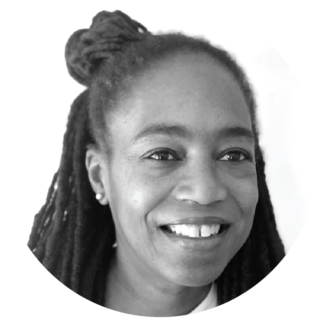Forum Lecture: Re-Assembling Practice
Monday, November 22nd, 2021 at 6:00 pm to 6:00 pm
- Tbd event

2021-2022 FORUM LECTURE SERIES: RE-ASSEMBLE
RE-ASSEMBLING PRACTICE
Monday, November 22, 2021
6:00 p.m. EST
Free public online event
Watch the video here.

Dr. Felecia Davis is an assistant professor at Pennsylvania State University’s Stuckeman Center for Design and Computation and director of SOFTLAB@PSU. She is also the principal of Felecia Davis Studio. She has lectured, taught workshops, published, and exhibited her work in textiles, computation, and architecture internationally, including at the Swedish School of Textiles, Microsoft Research, and the Media Lab at the Massachusetts Institute of Technology (MIT).
In addition, Davis has received several finalist awards for her architectural designs in open and invited competitions, such as the California Valley Central History Museum, the Queens Museum of Art addition, the Pittsburgh Charm Bracelet Neighborhood revitalization competition, and the Little Haiti Housing Association in Miami. Davis has taught architectural design for more than 10 years, including at Cornell University, and design studios, most recently at Princeton University and the Cooper Union in New York. She earned a PhD from the Design and Computation Group in the School of Architecture and Planning at MIT, and received her MArch from Princeton University. She also holds a BSc. in Engineering from Tufts University
This lecture will discuss current opportunities and challenges to conceive new modes of practice, reflecting on how we might re-assemble team structures and office hierarchies while further bridging academic research with pedagogy and professional practice. By showcasing Dr. Davis’s work, the lecture will focus on new means of design collaboration, foregrounding the increasingly blurred lines between professional and academic pursuits, theory and practice.
Our profession now brings together designers and scholars alongside industry and community partners. Many strive for a more comprehensive and intersectional understanding of environmental, technological, and social processes that impact their work. Modes of production and collaboration are changing to better integrate practice with theory. This is happening as approaches to design and construction rapidly evolve to account for accelerating technology, and designers become more ethically aware of their work’s socio-political impacts.
About Re-Assemble
From building materials to community connections, theoretical frameworks to programmatic uses, structural components to project teams, the notion of assembly is at the core of architecture. It is through these broadly defined yet interconnected assemblies that we construct our built environment. As we navigate new ways of convening and interacting with one another following the easing of lockdowns, the 2021-22 Forum Lecture Series turns to these many processes of architectural assembly and re-assembly.
Reflecting on the current state of society and design’s role within it, we ask: In what ways are people, places and practices today being re-assembled? How is this driving innovation in design research, professional practice, and pedagogy?
The history of architecture is one of perennial re-assembly—of building on and iterating theories, of reconfiguring design concepts, approaches, and collaborations, in addition to physically constructing materials and spaces. The altered social behaviors, ad-hoc spatial configurations, shifting demographics, and growing virtual realm of our past pandemic-focused year have only underscored our impetus to re-assemble.
Unpacking these dynamics, this lecture series investigates the future possibilities of physical, spatial, and operational re-assembly within our urban realm, acknowledging that these processes are not exclusively within the purview of design professionals.